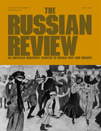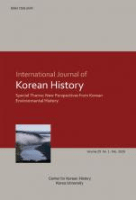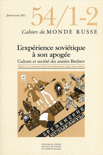
RUSSIAN REVIEW
Scope & Guideline
Cultivating Insight into Russia's Cultural Landscape
Introduction
Aims and Scopes
- Historical Analysis of Russia and the Soviet Union:
The journal frequently publishes articles that delve into various historical periods, examining significant events, cultural shifts, and the impact of political ideologies on Russian society. - Cultural Studies and Literature:
It showcases research on Russian literature, art, and cultural practices, highlighting the interplay between culture and politics, as well as the role of literary figures in shaping national identity. - Political Science and International Relations:
The journal explores contemporary political dynamics, including governance, state-society relations, and the implications of Russian foreign policy on global affairs. - Social Issues and Identity Politics:
Research focusing on social issues such as gender, ethnicity, and identity is prevalent, addressing how these factors influence the lived experiences of individuals in Russia and the former Soviet states. - Interdisciplinary Approaches:
The journal encourages interdisciplinary methodologies, integrating insights from history, sociology, anthropology, and cultural studies to provide a comprehensive understanding of complex issues.
Trending and Emerging
- Post-Soviet Identity and Memory Studies:
There is a marked increase in research exploring how post-Soviet societies construct their identities and memories, particularly in relation to historical trauma and the legacy of the Soviet past. - Environmental Issues and Sustainability:
Emerging scholarship focuses on environmental concerns within Russia, including ecological politics and the socio-cultural implications of climate change, reflecting a growing global awareness of environmental issues. - Digital Humanities and New Media:
The journal is increasingly featuring works that examine the impact of digital technologies on culture and society, including how new media shapes contemporary Russian narratives and identities. - Queer Studies and LGBTQ+ Narratives:
There is a rising interest in queer studies, with a focus on LGBTQ+ experiences in Russia, particularly in the context of state policies and societal attitudes towards gender and sexual diversity. - Cultural Memory and Historical Revisionism:
Research on cultural memory, particularly how historical narratives are contested and reinterpreted in contemporary Russia, is gaining traction, reflecting the ongoing debates about the past's relevance to present identity.
Declining or Waning
- Traditional Soviet Studies:
Research that solely focuses on the Soviet era in a conventional narrative style has seen a decline, as scholars increasingly seek to connect historical analysis with contemporary issues. - Western Perspectives on Russian History:
Articles that primarily adopt a Western-centric viewpoint of Russian history are becoming less common, as there is a growing emphasis on indigenous perspectives and local narratives. - Monolithic National Narratives:
The tendency to portray Russia as a singular entity without acknowledging its diverse regional identities and cultures has waned, leading to more nuanced examinations of regionalism. - Static Gender Studies:
Traditional gender studies that do not account for the evolving roles and representations of gender in contemporary Russian society are becoming less frequent, as newer frameworks addressing intersectionality gain prominence. - Simplistic Interpretations of Political Events:
The journal is moving away from overly simplistic analyses of political events, instead favoring complex and multifaceted examinations that consider various socio-political influences.
Similar Journals

International Journal of Korean History
Charting New Territories in Korean StudiesInternational Journal of Korean History, published by Korea University, Center for Korean History, is a leading academic journal dedicated to the exploration and dissemination of research on Korean history, culture, and literature. Since its establishment in 2000, the journal has embraced an Open Access model, ensuring that groundbreaking scholarship is freely accessible to researchers, professionals, and students worldwide. With an ISSN of 1598-2041 and an E-ISSN of 2508-5921, the journal has shown impressive rankings, currently holding a Q3 category in both Cultural Studies and History, and a Q2 category in Literature and Literary Theory as of 2023. Its Scopus rankings further highlight its academic significance, sitting in the 81st percentile for Literature and Literary Theory and maintaining a strong presence in related fields. Operating from Seoul, South Korea, the International Journal of Korean History serves as a vital platform for scholarly dialogue and research dissemination, contributing significantly to the global understanding of the intricate narratives that shape Korean history.

HERALD OF THE RUSSIAN ACADEMY OF SCIENCES
Navigating the Complexities of Culture and GovernanceHERALD OF THE RUSSIAN ACADEMY OF SCIENCES is a prominent interdisciplinary journal published by MAIK NAUKA/INTERPERIODICA/SPRINGER, specializing in the fields of cultural studies and political science. With an ISSN of 1019-3316 and an E-ISSN of 1555-6492, this journal features a robust platform for disseminating high-quality research that informs contemporary debates in social sciences. Over its converged years from 2005 to 2024, it has established itself as an influential source of scholarly articles, achieving a Q2 ranking in Cultural Studies and a Q3 ranking in Political Science and International Relations for 2023. The journal is recognized for its valuable contributions, with Scopus ranks reflecting a strong presence in both cultural studies (Rank #444/1304, 65th percentile) and political science (Rank #450/706, 36th percentile). Researchers, professionals, and students seeking to advance their understanding of the societal dynamics at play are encouraged to explore the insightful perspectives offered by this esteemed publication.

CAHIERS DU MONDE RUSSE
Unveiling the Complexities of Russian History and CultureCAHIERS DU MONDE RUSSE, published by EDITIONS ECOLE HAUTESETUDES & SCIENCES SOCIALES in France, is an esteemed journal dedicated to the interdisciplinary study of Russian history, culture, and politics. The journal embraces a variety of scholarly insights, making significant contributions to the fields of History, Political Science, and Sociology. With its ISSN 1252-6576 and E-ISSN 1777-5388, it has established a reliable presence in academic discourse since 1999, with continuous publications until 2024. Despite its current quartile rankings placing it in Q3 and Q4 categories in pivotal fields, CAHIERS DU MONDE RUSSE plays a critical role in fostering knowledge and discussion among researchers and students alike. It serves not only as a platform for disseminating research but also as a source of rigorous analysis and historical reflection, reflecting the dynamic evolution of Russian studies within the global context.

RUSSKAIA LITERATURA
Fostering Critical Thought in Russian LiteratureRUSSKAIA LITERATURA, published by the esteemed Russian Academy of Sciences and the State Academy of Humanities (GAUGN), is a prominent journal dedicated to the exploration and analysis of Russian literature and literary theory. Since its inception in 2013, the journal has established itself within the academic community as a valuable resource for scholars and students alike, aiming to elevate discourse and critical thought in the field. Although currently categorized in Q4 of Literature and Literary Theory by Scopus, it plays a significant role in fostering a deeper understanding of Russian literary heritage. The journal's commitment to rigor and quality is underscored by its inclusion in internationally recognized databases, making it a relevant venue for contemporary literary scholarship. Researchers and practitioners in the field will find RUSSKAIA LITERATURA an indispensable tool to access vital knowledge and contribute to discussions that resonate within and beyond the Russian context.

Cuadernos de Rusistica Espanola
Illuminating the Paths of Interdisciplinary ExplorationCuadernos de Rusistica Española is an esteemed scholarly journal dedicated to the field of Spanish and Russian studies, published by EDITORIAL UNIV GRANADA. With its commitment to Open Access since 2005, the journal fosters wide dissemination of knowledge and research, aiding scholars and students alike in exploring the intricate connections between Spanish and Russian linguistics, literature, and cultural studies. Based in Granada, Spain, the journal spans a broad scope of topics, making it a crucial resource for researchers aiming to advance understanding in comparative literature, language studies, and interdisciplinary approaches. The ISSN for the print version is 1698-322X and for the online version, 2340-8146. As an open-access platform, it increases accessibility and engagement with cutting-edge research findings, making it a vital contribution to the academic community.

Drevnyaya Rus-Voprosy Medievistiki
Bridging Past and Present through Rigorous ResearchDrevnyaya Rus-Voprosy Medievistiki is a prestigious journal published by INDRIK that focuses on the rich tapestry of medieval studies, particularly centered around the history and culture of Ancient Rus. With its ISSN 2071-9574, this journal aims to contribute significantly to the academic discourse surrounding medieval historiography, archaeology, and cultural studies through original research, comprehensive reviews, and scholarly articles. Although it does not currently operate under an open access model, Drevnyaya Rus remains a vital resource for researchers and students interested in the complexities of medieval civilization. Located in Moscow, Russia, the journal seeks to foster a deeper understanding of Eastern European history and its implications on contemporary society. By providing a platform for rigorous scholarship, it plays a crucial role in expanding the knowledge base within the field of medieval studies, thereby catering to the interests of historians, archaeologists, and cultural theorists alike.

Mundo Eslavo-Journal of Slavic Studies
Illuminating Contemporary Issues in Slavic RegionsMundo Eslavo - Journal of Slavic Studies is a prominent journal published by UNIV GRANADA, EDITORIAL, dedicated to advancing the field of Slavic studies through open access scholarship since 2004. With an ISSN of 1579-8372 and an E-ISSN of 2255-517X, the journal aims to provide a platform for interdisciplinary research, covering a wide array of topics including literature, culture, history, and linguistics of Slavic regions. Based in Granada, Spain, this journal is crucial for researchers, professionals, and students seeking to explore and contribute to the understanding of Slavic heritage and contemporary issues. With a commitment to accessibility and scholarly rigor, Mundo Eslavo invites submissions that push the boundaries of conventional discourse in Slavic studies, ensuring that critical insights and diverse perspectives reach a global audience.

Novyi Istoricheskii Vestnik-The New Historical Bulletin
Advancing Historical Scholarship for a Broader Understanding.Novyi Istoricheskii Vestnik - The New Historical Bulletin, published by IZDATEL STVO IPPOLITOVA, stands as a significant academic platform in the field of history, particularly within the Russian context. With an ISSN of 2072-9286 and established in 2012, this journal aims to foster rigorous scholarship and innovative research in historical studies, enhancing discourse amongst historians, researchers, and students alike. Although it currently holds a Q3 ranking in the Arts and Humanities - History category, its commitment to showcasing diverse historical narratives and promoting academic dialogue positions it as a noteworthy contributor to the field. The journal's scope covers a wide array of historical topics, encouraging submissions that illuminate various aspects of the past, whilst also serving as a vital resource for those seeking to understand contemporary historical discourse. As an open access journal, it promotes the accessibility of scholarly work, appealing to a broad audience intent on expanding their knowledge of history.

STUDIES IN EAST EUROPEAN THOUGHT
Connecting Diverse Methodologies to Eastern European ThoughtSTUDIES IN EAST EUROPEAN THOUGHT is a premier academic journal published by Springer, focusing on the multifaceted intellectual heritage and cultural dynamics of Eastern Europe. Established in 1993, this journal has been a significant platform for scholarly discourse, promoting interdisciplinary research across the fields of Cultural Studies, Law, Literature, Philosophy, and Social Sciences. With an impressive impact reflected in its Scopus rankings, including a Q1 categorization in Literature and Literary Theory and a Q2 standing in Cultural Studies and Law, it remains at the forefront of academic research, contributing to the global understanding of Eastern European perspectives. The journal is available in both print (ISSN: 0925-9392) and electronic (E-ISSN: 1573-0948) formats, with a committed audience of researchers, professionals, and students eager to explore the intricacies of Eastern European thought. By engaging with diverse methodologies and contemporary issues, STUDIES IN EAST EUROPEAN THOUGHT continues to shape the academic landscape and elevate scholarly discussions surrounding this vibrant region.

Noveishaya Istoriya Rossii-Modern History of Russia
Decoding the Layers of Contemporary Russian HistoryNoveishaya Istoriya Rossii - Modern History of Russia, published by ST PETERSBURG UNIV PRESS, is a premier peer-reviewed journal dedicated to the exploration and analysis of contemporary Russian history. With an ISSN of 2219-9659 and an E-ISSN of 2309-7973, this influential journal emphasizes critical scholarship across various historical epochs from 2015 to 2024, enhancing our understanding of Russia's complex socio-political landscape. Recognized with a Q1 category ranking in History for 2023, it serves as a significant platform for historians, researchers, and academicians interested in advancing discourse on Russian history. While it operates within a traditional access model, the journal remains committed to disseminating knowledge through rigorous research methodologies and comprehensive reviews. Located in the heart of St. Petersburg, this journal not only contributes to academic scholarship but also serves as a vital resource for students and professionals seeking in-depth knowledge of modern Russian historical narratives.